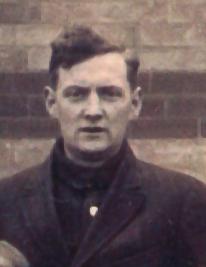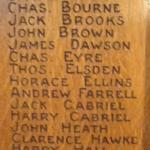BX September 30, 1915
In the list of casualties announced from Ottawa this morning appears the name of Albert John Herod, a member of the 19th Overseas Battalion, who is reported dangerously ill. Pte. Herod left Brantford on October of last year in the second contingent of Dufferin Rifles under Major “Bert” Newman. The battalion crossed over to France a few weeks ago. Pte. Herod is a married man and at the time of his enlistment he resided at 168 Dundas Street. By vocation Pte. Herod was a metal worker and prior to the outbreak of hostilities was a valued member of the 32nd Battery.
BX March 27, 1916
Close to 200 invalided soldiers reached Quebec on Saturday evening from St. John, where they disembarked from the Allan lined Sicilian. Among the number were two Brantford men, George William Dean and Albert John Herod.
March 30, 1916
Two Soldiers Will Return Home Tonight – Invalided Home, Two Brantford Heroes’ Will Arrive Tonight at 7.32 Over G.T.R.
Two more of Brantford’s heroes, Pte. Albert John Herod, and Lance-Corp. George William Dean are expected back in the city tonight on the 7.32 International Limited. Word to that effect was received by Ald. J.S. Dowling, chairman of the Soldiers’ Aid Commission, this morning, and since that time he has been busy making arrangements to give these young men, who have been wounded in defense of their country, a suitable reception. The 84th and 125th bands and several companies of soldiers will parade to the station to meet the train and welcome their wounded comrade’s home, while Mayor Bowlby, Ald. Dowling and several of the city aldermen will be on hand to give the boys an official welcome.
BX April 1, 1916
Returned Heroes, Private Herod and Lance-Corp. Dean Were Given a Splendid Welcome – Men Who Early in War Responded to the Empire’s Call were Tendered a Royal Reception on Their Return Home – Invalided Through Effects of Trench Warfare
After having taken their share in the world struggle, Lance Corporal George William Dean, 5 George Avenue, and Private Albert John Herod, 64 Richardson Street, two more Brantford veterans from the battle line in France reached the city last evening and were accorded a royal welcome that easily outdid any previous ones. Two military bands, hundreds of soldiers and a throng of citizens surrounded the station when the 7.33 train brought the heroes back home. Touching was the scene at the station when they met their wives in a waiting automobile after an absence of two years.
Two minutes ahead of time, the International Limited pulled into the station last evening and as it slowed down the big crowd was expectantly hushed. A few passengers got off the train, but there was no sight of the returned and expected heroes. The crowd began to imagine they had not arrived when there was a cry “There they are.”
Then from thousands of throats went forth a cheer and the representatives of the Soldiers’ Aid Commission had a hard task assisting them to the waiting automobiles. In one of these were sitting the expectant wives and a moment later the car was the centre of a touching scene that brought tears to many an eye. Outwardly, except for signs of being excited, both men looked fairly fit. Pte. Herod, however, wore black glasses.
More cheers and martial airs from the massed bands of the 84th and 125th bands and the parade was formed. With the bands playing in the lead, then the soldiers of both battalions and following this the incapacitated soldiers, the parade started down Market Street, with the throng following.
Instead of forming up on the north side of the Market Square, where the civic reception to returned soldiers is generally given, the concourse betook itself to the square facing the headquarters of the 215th Battalion. Here, using the car of honor as a platform, several prominent citizens fittingly welcomed the heroes home.
Herod’s Experience
Pte. Herod, who lives with his wife at 64 Richardson Street enlisted for active service on October 26th, 1914, with the 19th Battalion and went with a draft of 120 men to Toronto. After two months spent in the trenches in Belgium, at Messines about the latter part of September he contracted a severe form of cerebral spinal meningitis which so effected his system that his removal to the hospital was made necessary. He spent considerable time at the hospitals in France and England and at St. Ann where he underwent six operations in the hope of being cured of his illness which affected his eyes and strained his system severely, leaving him in bad shape. After recovering somewhat he was removed to the hospital at West-Gate-on-Sea, England, but the trip brought on a relapse, which necessitated a long sojourn there. The treatment he received, especially in the hospitals in France, he describes as being the finest that could be desired. Although with the exception of his eyes upon which he wears strong glasses. Pte. Herod looks quite well; he is still suffering considerably at times from internal complications brought on by the disease. Although glad to be home again he feels that he has only done what every other young eligible man should do at this crisis in the empire’s history.
Addresses of Welcome
At the market last evening Ald. Dowling, on behalf of the Soldiers’ Aid Commission of which he is chairman, and on behalf of the city in the absence of Mayor Bowlby, officially bade the heroes a hearty welcome back to the city, after which Joseph H. Ham, M.L.A. and Lieut.-Col. Harry Cockshutt gave brief but fitting addresses. Ald. Dowling explained a little of what the commission was for, and how glad it would be to do anything possible to assist, if necessary, these men who did all in their power for the cause. He felt that as they were among the first to leave, a little more honor was perhaps due them than to those who enlisted later.
Mr. Ham, after expressing the great pleasure he felt in extending a welcome to these noble boys, told of his trip with them from Toronto that evening, when he had had the pleasure of talking with them and hearing a little of their stories. When he announced the fact that both of these boys had been among the first to leave and that Corp. Dean had been through the South African war and had been about the fifth or sixth to enlist from Brantford when the call of the motherland first came, the crowd cheered vociferously. He, also as a member of the commission, expressed the pleasure it was for them to do anything possible for the returned soldiers, who had either contracted illness or been wounded while in performance of their duties.
“These men have done their bit, it is now up to us to do our part,” said Col. Cockshutt, the popular commander of the 215th who was, as usual given a great ovation on his rising to speak. It was now possible for the men from Brantford to stand together while fighting for the defence of the country and its flag. Now that the 125th were ready to go he hoped they would cover themselves with honor, and when they did so he felt sure that the people of Brantford would be glad to welcome them back once more, the same as was being done at that time. As a citizen of Brantford and a soldier Col. Cockshutt was glad to welcome them back. While they were coming home he and his men were getting ready to leave, but they had shown the true soldiers’ hearts.
After many more hearty cheers had been given the soldiers called for a speech from the heroes. Corp. Dean expressed himself as being too excited to speak; in fact he said he felt more like crying than making a speech. After expressing the thanks he felt for the reception accorded him he told the boys that there was plenty of room for them all in the war zone. Although he had not been as good a man as he thought he was when he left he had tried to do his bit, and as willing to do a bit more after they had done theirs. Pte. Herod also thanked the crowd who had turned out to honor him and stated that while he had never done a great deal he had at least done the best he could. He concurred with Corp. Dean in the statement that there was plenty of room for them all, and plenty for them to do.



